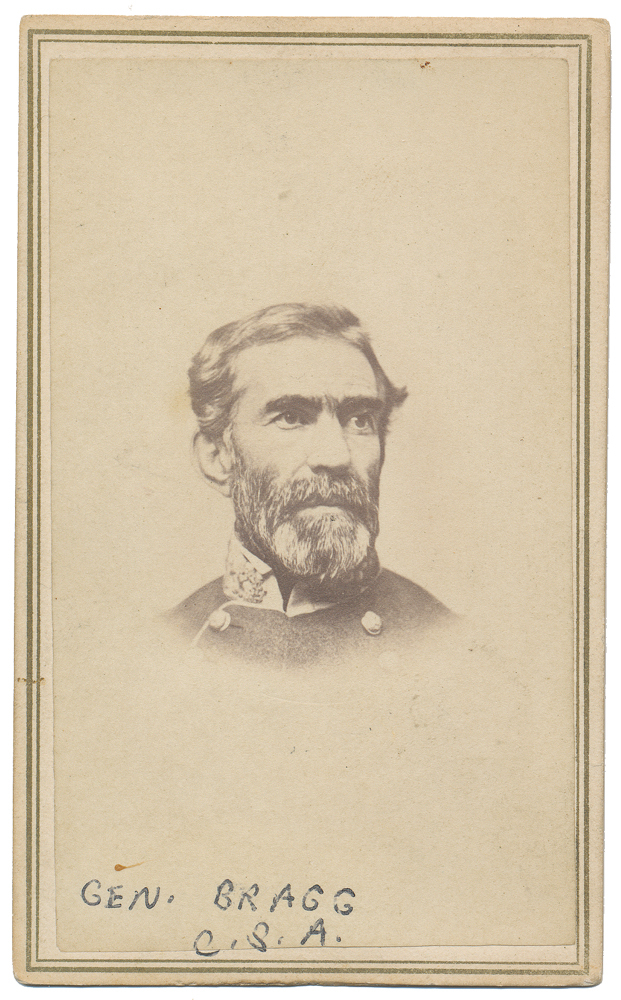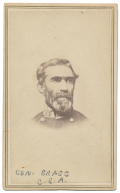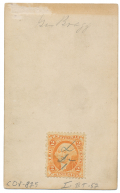site search
online catalog
NICE BUST VIEW FROM LIFE OF GENERAL BRAXTON BRAGG

$300.00
Quantity Available: 1
Item Code: 1138-52
Shipping: Determined by Method & Location of buyer
To Order:
Call 717-334-0347,
Fax 717-334-5016, or E-mail
Good clear image of Bragg in Confederate uniform. Top two buttons and collar of his coat with rank insignia are visible.
Paper and mount are very good. Unfortunately, someone wrote “GEN. BRAGG C.S.A.” at bottom in modern ink.
Reverse is blank but for a canceled 2 cent tax stamp and some collector information in pencil along the bottom.
From the collection of the late William A. Turner.
Braxton Bragg was born on March 22, 1817 in North Carolina. Although he would come to be known for his abrasive personality, a school teacher described the nine-year-old Bragg as having a "tractable and docile disposition."
Bragg graduated from West Point in 1837 and went on to serve in the Seminole War and the Mexican War. He retired from the military in 1856 to become a planter in Louisiana. When the Civil War broke out, Confederate President Jefferson Davis made Bragg a Brigadier General. Davis' faith in Bragg's abilities stemmed from an incident that occurred during the Mexican War. Davis' Mississippi regiment had been among the few American soldiers who had refused to retreat when the Mexicans attacked their left flank at the Battle of Buena Vista in February 1847. Just as Davis' regiment began to fall back under the assault, Bragg's troops arrived in force to hold off the Mexicans, allowing Davis to reorganize and hold his position. The two men came to admire each other through their service in Mexico.
By the time the Confederates were battling for Tennessee, Braxton Bragg was a full General commanding nearly 40,000 troops and was responsible for the fate of the state. President Davis' experience with Bragg contributed to his refusal to replace the commanding General of the Army of Tennessee when other officers serving with Bragg repeatedly insisted that their commander be removed. Bragg's curious personality would often cause him to break with propriety by behaving rudely to superiors and committing acts of insubordination.
Bragg's career as a field commander, like his sense of propriety, was based in contradictions. Though skillful in planning attacks, he frequently had difficulty in executing them. Bragg had the distinction of being both recklessly offensive as well as hesitant to the point of ineffectiveness at various times in his career; sometimes in the same battle. Perhaps his erratic behavior was partially due to the fact that he often suffered severe migraine headaches.
Before the Battle of Shiloh, Bragg would advise his commander to delay attacking Grant (fortunately for the South, Bragg was ignored), despite the fact that it was essential that Grant be attacked before his forces could be united with those of Union General Don Carlos Buell. Again, after his tactical victory at Stones River, Bragg withdrew and abandoned crucial middle Tennessee to the Union because he feared the rising tide of the river would trap part of his army.
Later that year, after a decisive victory at Chickamauga, Bragg passed up the opportunity to smash the Union forces. Instead, he allowed the Federals to retreat to Chattanooga, Tennessee because he felt the local terrain was ideally suited for a siege, and would give his exhausted army a chance to refit and recuperate. Unfortunately for the Rebels, General Ulysses S. Grant eventually rescued the Union forces trapped at Chattanooga. Bragg's hesitancy won him no favor with the Confederate generals serving under him.
Lt. General James Longstreet called on President Davis to remove Bragg. Davis traveled to Chattanooga to get a first-hand look at the trouble. Characteristically, Davis decided to stick by the man who had once rescued him, and instead transferred the generals that felt particularly hostile to Bragg.
Bragg finished the war as Army Chief of Staff and eventually commanding a division in Joseph E. Johnston's Army of Tennessee. After being relieved by Johnston, he returned to join his friend Jefferson Davis as a military adviser. After the war, he lived out the remainder of his life as a civil engineer. He died September 27, 1876. [ad] [ph:L]
~~~~~~~~~~~~~~~~~~~~~~~~~~~~~~~~~~~
THIS ITEM, AS WITH ALL OTHER ITEMS AVAILABLE ON OUR WEB SITE,
MAY BE PURCHASED THROUGH OUR LAYAWAY PROGRAM.
CLICK HERE FOR OUR POLICIES AND TERMS.
THANK YOU!
Inquire About NICE BUST VIEW FROM LIFE OF GENERAL BRAXTON BRAGG
For inquiries, please email us at [email protected]
Most Popular
Historical Firearms Stolen From The National Civil War Museum In Harrisburg, Pa »
Theft From Gravesite Of Gen. John Reynolds »
Cavalry Carbine Sling Swivel »
Fine Condition Brass Infantry Bugle Insignia »
featured item
VERY RARE US MODEL 1840 AMES CAVALRY OFFICER’S SWORD WITH QUILLBACK SOLINGEN BLADE
Very rare Ames with gold washed, quillback, Damascus blade from Solingen. Manufactured: Springfield, MA / Solingen Maker: N.P.Ames Year: C1840s Model: M1840 Size: 33 5/8 inch blade length, 1.18 wide Condition: Excellent+ This is obviously a product… (870-238). Learn More »




